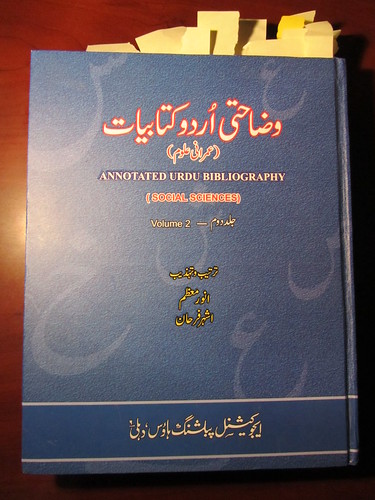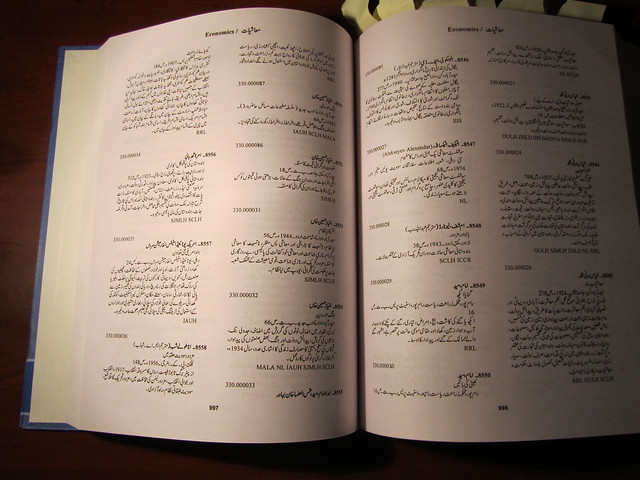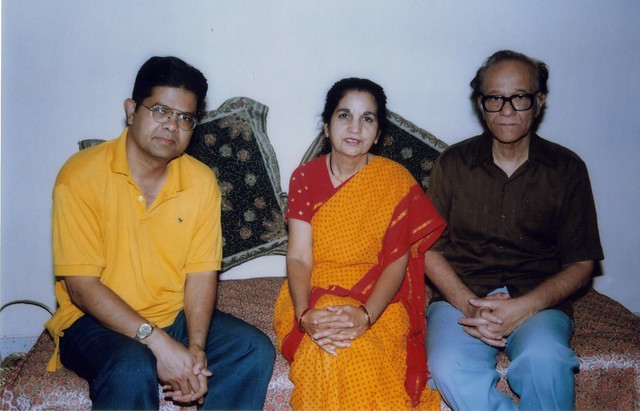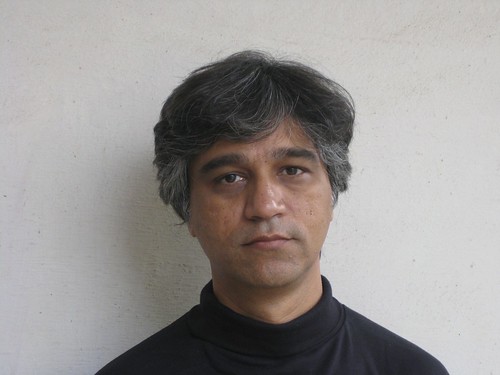By Dr Omar Khalidi
Dr. Anwar Moazzam, former professor of Islamic Studies at Osmania University in Hyderabad, Deccan, India and Ashhar Farhan, an info-technologist and entrepreneur has compiled a massive, epoch-making bibliography of works in social sciences in Urdu. Dr. Moazzam launched the project way back in 1976, under the auspices of Indian Council for Social Science Research and National Council for the Promotion of Urdu Language, both institutions funded by the union government of India in New Delhi.
The fruits of Dr. Moazzam ‘s labors have come to fruition after decades of painstaking work. The four volume set—two volumes each in Urdu’s own script as well as in roman transliteration—carries a staggering 9200 plus entries. The two volumes in roman transliteration are meant for those who are not familiar with Urdu script but may be able to have the books read for them.

|
Annotated Urdu Bibliography (Social Sciences)=Wazahati Urdu Kitabiyat, (Umrani Ulum), compiled and annotated by Anwar Muazzam and Ashhar Farhan. New Delhi: Educational Book House, 2008. In 4 volumes, 2 in Urdu script, 2 transliterated into Latin alphabets. ISBN 81-8223-380-1 |
The Bibliography is devoted to works on social sciences—any title outside the category of belles-lettres. The social sciences in this work are divided into: Ethics, Anthropology, History (General), History (Countries), Education, Technology, Geography and Travel, Biography, Political Science, Personal Hygiene, Home Economics, Sociology, Arts and Sculpture, Law, Commerce, Library Science, Essays, Economics, Managerial Services, Public Administration, and Psychology. Chronologically, the citations begin in 1850s and end in 1980s.

The editors obtained the bibliographic data directly from the books after examining them first in four major libraries of Hyderabad—where they are based. The four libraries are State Central —formerly Asafiya—Library, Salar Jang Museum Library, Idarah-i Adabiyat-i Urdu Library and Osmania University Library. Then the editors examined the collections in ten other major libraries, namely the National Library of India, Kolkata, Khuda Bakhsh Library, Patna, Raza Library, Rampur, Aligarh Muslim University Library, Jamia Millia Islamia Library, New Delhi, and Nadwat al-Ulama Library in Lucknow. To this incorrigible bibliophile, this is dream come true—to access just about the fullest extent of what has been published in India at least up to the 1980s.
From the perspective of the users, the most helpful features of the Bibliography are, first, the books in fact exist in particular libraries and indicated as such within each entry, so that the user can actually visit the library or seek copies or photocopies; second, the entries are annotated so that the contents are revealed rather than imagined. The entries are arranged according to Dewey decimal classification system with slight modification. Two indices—one for authors, editors, translators, and the other subject headings, further help the readers reach their desired book. In addition to the printed volumes, the Bibliography is available in a searchable digital form. Interested readers should contact Dr Anwar Moazzam at [email protected]
The printed volumes may be purchased from Educational Publishing House www.ephbooks.com
And may be contacted at email [email protected]
The price is Indian Rupees 3000.00 per set of four hardback volumes, printed on high quality paper.

Dr. Omar Khalidi (left) with Jilaani Bano and Anwar Muazzam in 1998.

Ashhar Farhan
This is a massive project successfully realized, and the editors deserve readers’ sincere thanks for completing a monumental task. This major undertaking must inspire others to think of an even more ambitious project: A Bibliography of Urdu Books published from 1800-2000, covering two centuries of publishing. There is a firm basis for it now that we have Dr. Moazzam and Farhan’ s work, which can be supplemented by the Qawmi Kitabiyat, published by the Government of India’s Ministry of Culture. So far Qawmi Kitabiyat has been published since 1958 and the most recent volume covered the years 2001-2002. It is distributed by Director of Printing and Stationary, Allahabad, UP. The US Library of Congress’s Accession List for South Asia can be another source for the proposed Bibliography of Urdu Books, 1800-2000. What is needed is a book on the model of Dr Moazzam’ s book based on holdings in the libraries in Karachi, Lahore, Peshawar, Islamabad and wherever else in Pakistan. Once that project is done, research based on Urdu sources will advance manifold. Will Pakistani scholars emulate this excellent example set in HyderAbad, Deccan, the southern stronghold of Urdu, Pakistan’s national language?
—
Dr. Omar Khalidi can be contacted at [email protected]

